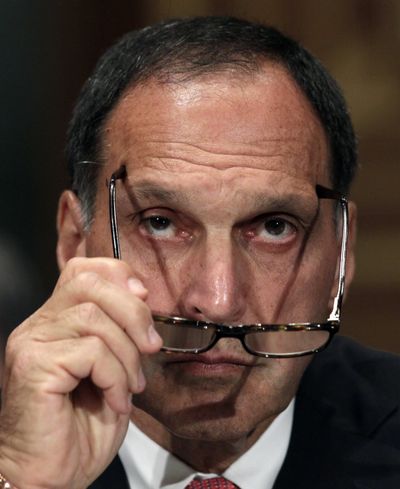Lehman Brothers was denied bailout, former executive says
Fuld testifies company made every effort to avoid collapse

WASHINGTON – The former chief of Lehman Brothers told a panel investigating the financial crisis that the Wall Street firm could have been rescued, but regulators refused to help – even though they later bailed out other big banks.
Richard S. Fuld Jr. told the Financial Crisis Inquiry Commission at a hearing that Lehman did everything it could to limit its risks and save itself in the fall of 2008.
“Lehman’s demise was caused by uncontrollable market forces, and the incorrect perception and accompanying rumors that Lehman did not have sufficient capital to support its investments,” Fuld testified. He said Lehman proposed measures to federal regulators that could have saved the firm, but “each of those requests was denied.”
Unfairly, Fuld said, other financial firms later received the government assistance that Lehman was denied. Lehman was “mandated” by regulators to file for bankruptcy on Sept. 15, 2008 – the only firm ordered to do so, he said.
Lehman’s collapse into the biggest bankruptcy in U.S. history triggered a panic in financial markets.
“Lehman was forced into bankruptcy not because it neglected to act responsibly or seek solutions to the crisis, but because of a decision, based on flawed information, not to provide Lehman with the support given to each of its competitors,” said Fuld.
Thomas Baxter, general counsel of the New York Federal Reserve, told the panel that the Fed and other agencies “tried incredibly hard to save” Lehman.
After the subprime mortgage bubble burst in 2007, complex investments called credit default swaps – which insured against default of securities tied to the mortgages – collapsed. That brought the downfall of Lehman.
U.S. government officials declined to rescue Lehman. Instead, they injected tens of billions of dollars into other financial firms.
One such firm was Wachovia, which had a huge amount of business in adjustable-rate mortgages, enticing borrowers who later defaulted on their home loans. In late September 2008, the FDIC, the Federal Reserve and the Treasury Department found that Wachovia posed a “systemic risk to the financial industry and the economy,” FDIC official John Corston says in his testimony.
Aided and prodded by the government, Wells Fargo acquired the Charlotte, N.C.-based bank. The $12.7 billion deal, announced in early October 2008, created an institution with operations in 39 states and the District of Columbia.
Under the landmark financial overhaul law enacted in July, regulators are empowered to shut down financial institutions whose collapse could threaten the system.
At the hearing, regulators defended allowing Lehman Brothers to collapse and justified supporting the purchase of Wachovia. The regulators said both decisions made sense under the circumstances.